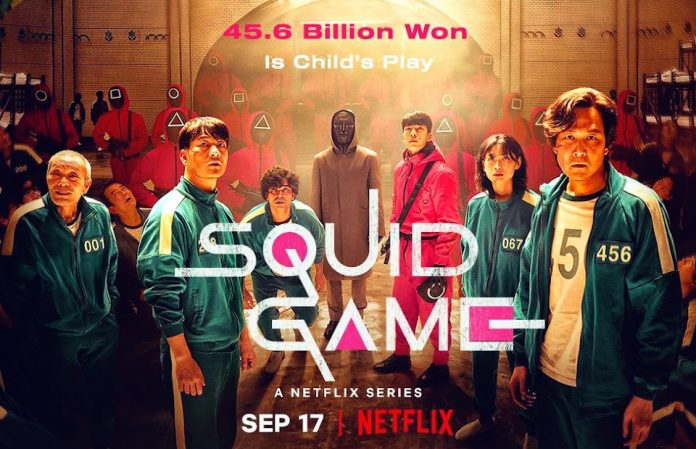Dystopia is not that far into the future—we are living in survival-of-the fittest times. Korean writer-director Hwang Dong-hyuk turns human fear, greed and gambling instinct into a terrifying nine-part series, Squid Game, which has turned out to be Netflix’s biggest hit.
Korean romantic dramas and boy bands have found popularity on television—good dubbing and subtitles knock down the language barrier—but this one has audiences watching in horrified fascination as desperate people play deadly versions of traditional Korean children’s games, orchestrated by thrill-seeking sadists. If they win, they get unimaginable wealth, if they lose they die.
Reminiscent of William Golding’s survivalist classic Lord Of The Flies, Japanese film Battle Royale, and Hollywood’s Hunger Games, the show boasts terrific production values. For over a decade, no studio was willing to buy the idea for this show, and now it is a global sensation, with a Season 2 in the works. It has been subtitled in 31 languages and dubbed in 13. Is it because audiences have become desensitized to violence, and unsympathetic towards people considered ‘losers’?
The main protagonist, Seong Gi-hun (Lee Jung-jae), after losing his job, has allowed his life to unravel due to his gambling. His wife has left him and remarried, taking their daughter with her, he cannot pay for his ill mother’s treatment, and is under a pile of debt he has no means to repay. Loan sharks have threatened to remove his kidney and his eye if he fails to pay up. When he hits rock bottom, he is approached by a mysterious stranger, promising him a bounty that will solve all his problems. All he has to do is play some games that require no particular skills.
Gi-hun is rendered unconscious and taken to a mysterious location with sterile walls and bunk beds, right out of a sci-fi nightmare. The 456 other wretched men and women, hoping to rid themselves of debt are guarded by masked and armed guards in magenta costumes resembling PPE kits. They are told the rules—if they are not able to keep up they are eliminated. In the first game, the participants discover that elimination means death, and just 255 stay alive at the end of the first round.
The survivors beg and plead to be allowed to leave, in spite of the agreement they signed. By a democratic process of voting, they free themselves, but as a character says, inside they have some chance, outside there is none. They return to give fate a chance—the old man who has a brain tumour (O Yeung-so) and little time to live, the young woman (Jung Ho-yeon) who wants to bring her family to South Korea, the futures trader (Park Hae-soo) who lost billions of clients’ money, the Pakistani immigrant (Anupam Tripathi) whose boss stiffs him, and other no-hopers like them.
As the series progresses and the games get increasingly violent, there are also flashes of humanity and generosity among the participants; it is almost as if the perverse voyeurs who are watching the massacre, and the audience enjoying the series with a there-but-for-the-grace-of-god-go-I attitude are the evil ones. Squid Game does—deliberately or unwittingly—become a metaphor for pandemic times. Who is spared by the virus, who races to get the vaccine is like that game, controlled by invisible puppeteers.








